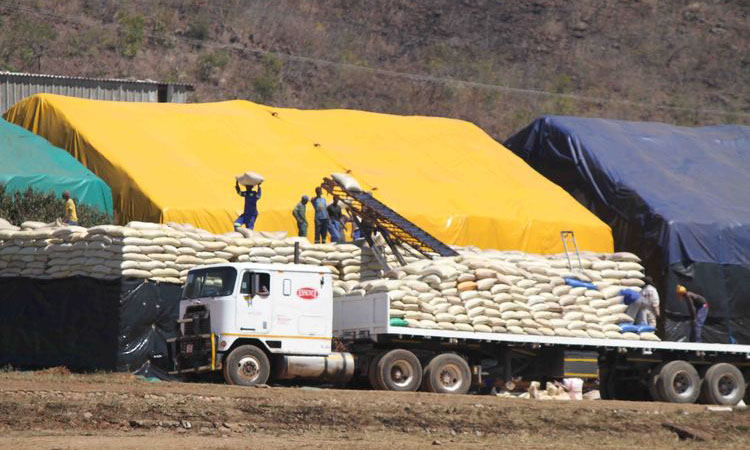
The ManicaPost

Samuel Kadungure
Senior Reporter
ZIMBABWE is on a solid come-back to reclaim its status as the breadbasket of Africa, and on course to export maize and wheat following bumper harvests of the two crops, a senior Government official has said.
Ministry of Lands, Agriculture, Water, Fisheries and Rural Development’s Permanent Secretary, Dr John Basera, said this during a wheat field day at Middlespous Farm in Makoni last week on Friday, hosted by Sahwira Agriculture, which has a joint venture with Defence and War Veterans Affairs Minister, Honourable Oppah Muchinguri-Kashiri.
The feat is predicated on a serious mechanisation drive to modernise agriculture and improve efficiency as well as boasting and capacitating the extension services delivery system.
The country needs about 35 000 tractors to fully mechanise farms, against a current fleet of 12 000.
The country now boasts of 7000 agriculture extension officers who were given bikes for mobility and tablets for e-extension and intellectual enhancement.
Sahwira Agriculture, a special purpose vehicle for Nyaradzo Group, planted 90 hectares of wheat which is now at vegetative stage, with an expected yield of six tonnes per hectare.
Dr Basera said Government will continue to capacitate extension officers and import tractors to improve agriculture efficiency.
“We took a deliberate decision to expand our extension services, and we now have 7 000 officers with motor bikes and tablets for e-extension.
“We will also continue importing tractors and hand-over to banks to administer them, do the recoveries and create a revolving fund that will enable us to import more.
“We need about 35 000 tractors to mechanise and modernise our agriculture and spur production and productivity. Currently we have about 12 000 tractors,” he said.
Dr Basera said farm machinery and equipment is accessible under the Belarus Phases One, Two and Three, the US$51 million John Deree, AFC Leasing and the US$20 million William Bain facilities.
Government, he said, allocated 600 tractors and 60 combine harvesters to AFC Leasing Company to cater for those who require hiring services.
“That is how we can transit from subsistence to surplus and commercial-oriented production. That is how we can ramp up our productivity levels.
“If we increase our productivity level by 10 percent, then we stand a good chance to reduce poverty by seven percent, hence our concerted efforts to mechanise and boast the extension delivery system,” he said.
Dr Basera praised wheat farmers, highlighting that the country has 140 000 metric tonnes of wheat in strategic reserves.
“The country is food secure, and last year we achieved 2.3mt tonnes of maize and about 280 000mt of traditional grains. We had 300 000mt in strategic reserves, which gives us about three million metric tonnes of food available in the country, against a national demand of 2.2 million metric tonnes, thereby leaving a surplus of about 700 000mt.
“We are food secure as a country, which is a fundamental building bloc on our journey to Vision 2030. The wheat production segment is also growing. Our national demand is 360 000mt, and in 2022 we achieved a record harvest of 375 000mt, up from 81 000ha.
“Currently, we are sitting on strategic wheat reserves of 140 000mt, and this season we are projecting 420 000mt. Considering that more maize is being delivered to GMB, we are actually running out of storage space and beginning to think of exporting cereals.
“We have planted 86 466ha of wheat, and our target is an average of 4.85 tonnes per hectare, which gives us a national target of 420 000mt.
“We need to adopt good agronomic practices to achieve these targets and export our wheat.
“We are coming back strongly as the food basket of Africa, and we are equal to the task,” he said.
Dr Basera said his ministry has imported nine drones to bust quelea birds, which are a major threat to wheat production.
Minister of State for Provincial Affairs and Devolution, Honourable Nokuthula Matsikenyere said Manicaland surpassed its target of 10 000ha and planted 11 867ha.
She said farmers still need top-dressing fertiliser to attain better yields.
Minister Matsikenyere said the Presidential Inputs Scheme (PIP), which targeted small-holder communal, old resettlement and A1 farmers drastically improved wheat uptake in the province.
The scheme accounts for about 48 percent of the planted hectarage, with beneficiaries having received US$700 worth of inputs per hectare for free.
The farmers were given Compound D, Ammonium Nitrate, wheat seed and chemicals for up to seven hectares.



